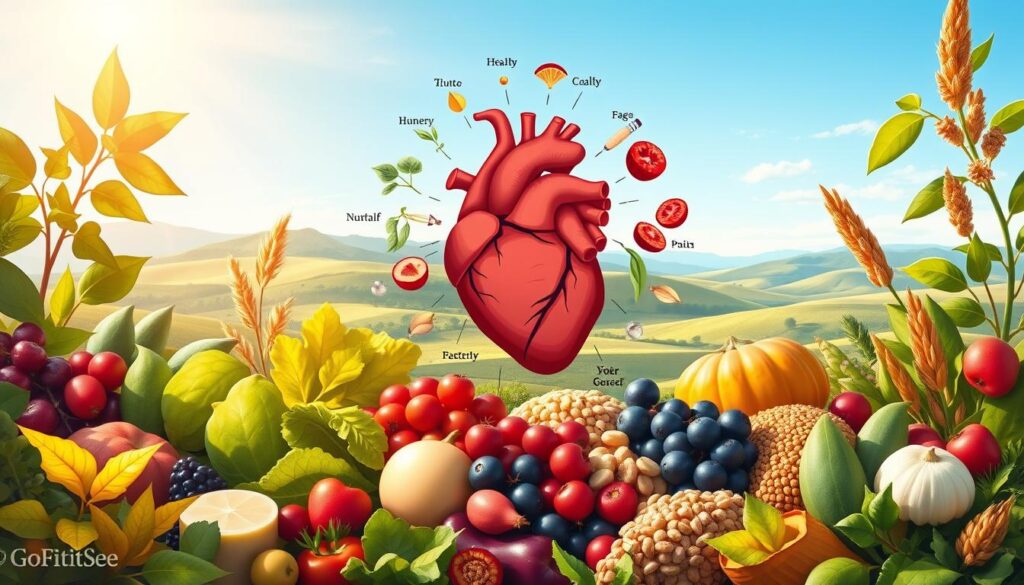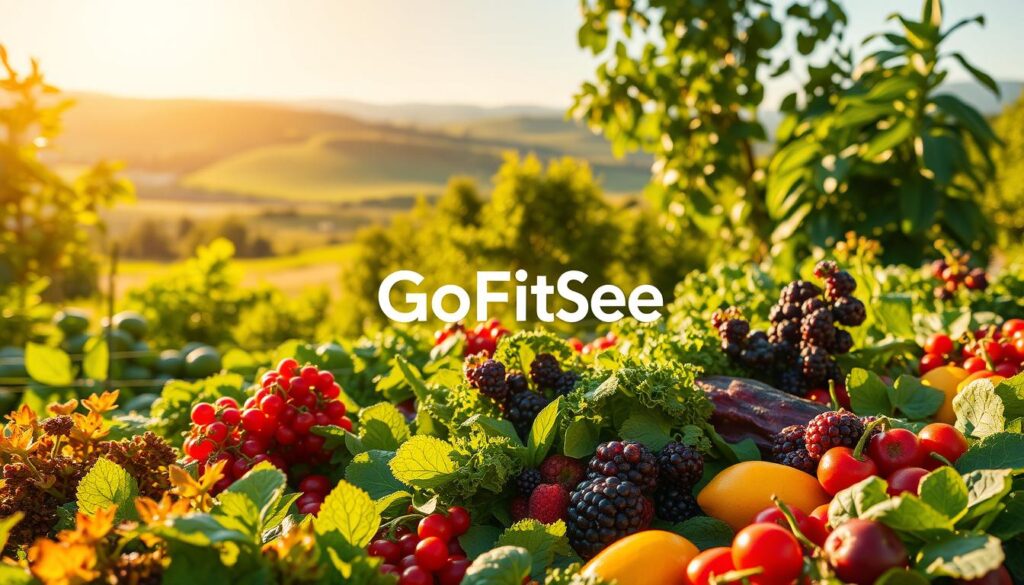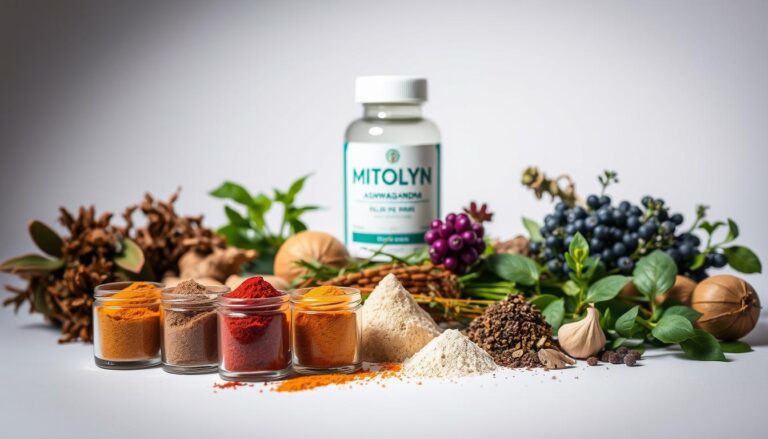Plant-Based Diet Benefits: Ever thought a simple diet change could transform your health in a month? This guide uncovers the amazing benefits of plant-based diets. Imagine boosting your energy and improving your health in just 30 days. It’s a fascinating idea, isn’t it?
This guide will teach you everything about plant-based nutrition. You’ll learn how to plan meals and discover the many health benefits. You’ll also hear from people who’ve seen real changes and learn about the environmental perks. Plus, you’ll get tips to make the switch easier.
Table of Contents
Key Takeaways
- Discover the numerous plant-based diet health advantages.
- Learn practical reasons to adopt a plant-based diet.
- Uncover the positive plant-based diet impact on health in just 30 days.
- Gain insights into plant-based nutrition and debunk common myths.
- Receive a detailed week-by-week meal plan to facilitate a smooth transition.
Why Choose a Plant-Based Diet?
Switching to a plant-based diet has many health benefits. It focuses on whole, unprocessed plant foods. This way, people can enjoy better health and get more nutrients.
Understanding Plant-Based Nutrition
A well-planned plant-based diet gives you all the nutrients you need. Foods like fruits, veggies, nuts, seeds, and whole grains are full of antioxidants. They help keep you healthy and protect against diseases.
Choosing plant-based nutrition can improve your heart health and lower cholesterol. It also reduces the risk of type 2 diabetes.
Breaking Down the Myths
There are many myths about plant-based diets. One is that they lack protein. But foods like lentils, chickpeas, tofu, and quinoa are great sources of protein.
Another myth is that plant-based diets are too restrictive. But they offer a wide variety of tasty foods to enjoy every day. Many people find it easier to stay healthy and have more energy with a plant-based diet.
Research shows that plant-based diets lead to better health. Nutrition experts and science support the benefits of plant-based eating. It’s becoming more popular and celebrated.
Essentials of a Plant-Based Diet: Foods to Include
Starting a plant-based diet is more than just cutting out animal products. It’s about exploring a variety of tasty, healthy foods. We’ll look at the key foods in a plant-based diet and how they boost your health.
Fruits and Vegetables
Fruits and vegetables are the heart of a plant-based diet. They’re packed with vitamins, minerals, antioxidants, and fiber. Eating a variety of colors ensures you get all the nutrients you need for good health.
Whole Grains
Whole grains are full of complex carbs, fiber, and vitamins. Foods like oats, quinoa, and brown rice give you lasting energy. They also help with digestion. Choosing whole grains over refined ones boosts your nutrient intake and keeps you full.
Legumes and Nuts
Beans, lentils, chickpeas, and nuts are superfoods in a plant-based diet. They’re high in protein, fiber, and micronutrients. Legumes are great in soups and salads, while nuts and seeds add flavor to many dishes.
“Integrating a variety of plant-based foods is key to unlocking the full plant-based diet benefits, ensuring you get all the necessary macronutrients and micronutrients.”
When planning meals, aim for a mix of fruits, vegetables, whole grains, legumes, and nuts. Here’s a table showing the nutrients and benefits of each group.
| Food Group | Key Nutrients | Health Benefits |
|---|---|---|
| Fruits | Vitamins C & A, potassium, fiber | Boosts immunity, supports skin health |
| Vegetables | Vitamins K & C, folate, dietary fiber | Improves digestion, reduces inflammation |
| Whole Grains | Fiber, B vitamins, magnesium | Enhances energy, supports heart health |
| Legumes | Protein, iron, fiber | Increases muscle health, stabilizes blood sugar |
| Nuts & Seeds | Healthy fats, protein, vitamin E | Supports brain function, promotes healthy skin |
Top Plant-Based Diet Benefits
Starting a plant-based diet brings many health benefits. It can improve your digestion and boost your energy. These changes are backed by science and experts.
Improved Digestive Health
One big plus of a plant-based diet is better digestion. Plants are full of fiber, which is key for a healthy gut. Fiber helps with regular bowel movements and keeps your gut balanced.
People who eat more fruits, veggies, and whole grains have fewer tummy troubles. The fiber in these foods keeps your digestive system running smoothly, lowering the chance of stomach problems.
Boosted Energy Levels
Plant-based diets also give you more energy. They’re full of vitamins, minerals, and antioxidants that boost your energy and health. These nutrients help your body make energy all day long.
Eating foods like whole grains, legumes, and veggies gives you steady energy. This avoids the energy ups and downs from sugary and processed foods. You’ll feel more productive and happy.
“A plant-based diet is undoubtedly one of the best dietary choices you can make for long-term health and energy. The natural, nutrient-dense foods available in a plant-based regimen ensure your body functions optimally.” – Dr. Michael Greger
Choosing a plant-based diet brings many health benefits. It helps you stay full of energy and feel your best. It’s a step towards a healthier, happier life.
| Benefit | Contributing Factors |
|---|---|
| Improved Digestive Health | High fiber intake, balanced gut microbiome, reduced gastrointestinal disorders |
| Boosted Energy Levels | Nutrient-dense foods, stable energy release, enhanced vitality |
30-Day Plant-Based Diet Plan: Week-by-Week Guide
Starting a plant-based diet might seem hard, but a clear plan makes it easy. This guide helps you slowly get into a plant-based lifestyle. It shows why a plant-based diet is good for you and how it can improve your health.
Week 1: Transitioning to Plant-Based Eating
The first week is all about getting used to plant-based eating. Start by swapping animal products with plant-based ones in your favorite dishes. Try plant-based milk, meat substitutes, and new veggies and grains.
Week 2: Incorporating More Variety
By Week 2, you’re ready to mix things up. Add colorful fruits, veggies, nuts, and seeds to your meals. This variety is key to getting all the nutrients you need, which is important for your health.
Week 3: Meal Planning and Prep
Week 3 is all about planning and preparing your meals. Making a meal plan helps you eat well and makes shopping easier. Cooking in bulk and storing meals saves time and keeps you on track, which is a big reason to go plant-based.
Week 4: Maintaining Consistency
The last week is about keeping up your new habits. Think about what you like and adjust your meal plans. Keep trying new recipes. Staying consistent boosts your commitment and health benefits.
Plant-Based Diet Benefits for Weight Loss
Switching to a plant-based diet can help you lose weight in a lasting way. It focuses on foods from plants, offering many benefits for weight control. Let’s look at why a plant-based diet is good for managing weight.
Calorie Density and Portion Control
One key benefit is calorie density. Foods like fruits, veggies, whole grains, and legumes have fewer calories. This lets you eat more without gaining weight. It also makes it easier to control how much you eat.
Metabolism Boost from Plant Foods
Plant-based foods are full of nutrients and fiber, boosting your metabolism. They keep your energy steady and help your body work well. Fiber also helps with digestion and blood sugar control, aiding in weight management.
| Plant-Based Food | Calories per 100g | Benefits |
|---|---|---|
| Spinach | 23 | High in fiber, low in calories |
| Lentils | 116 | High in protein, boosts metabolism |
| Quinoa | 120 | Rich in vitamins and minerals |
In summary, focusing on these benefits can lead to lasting weight loss. By understanding calorie density and the metabolic benefits of plants, you can keep a healthy weight.
Plant-Based Diet Benefits for Heart Health
A plant-based diet does more than help with weight. It greatly improves heart health too. Studies show that eating lots of fruits, veggies, whole grains, nuts, and seeds can cut down heart disease risks.

One big plus is lowering high blood pressure. Foods like leafy greens and beets help blood vessels open up. This improves blood flow and lowers blood pressure.
Also, these diets can make cholesterol levels better. Foods like oats and beans have soluble fiber. This fiber helps lower bad cholesterol and raises good cholesterol, which is good for the heart.
Plant-based diets also fight inflammation. Foods like berries and green tea have antioxidants and phytochemicals. These help reduce inflammation in the body, which is linked to heart disease.
| Nutrient | Source | Heart Health Benefit |
|---|---|---|
| Potassium | Bananas, sweet potatoes, spinach | Regulates blood pressure |
| Soluble Fiber | Oats, beans, flaxseeds | Lowers LDL cholesterol |
| Antioxidants | Berries, dark chocolate, green tea | Reduces inflammation |
Choosing a plant-based diet is in line with the American Heart Association’s advice. It leads to long-term heart health benefits. This can make your life healthier and more vibrant.
The Environmental Impact of Plant-Based Eating
Switching to a plant-based diet has big benefits for the planet. It helps reduce our ecological footprint, saves water, and supports sustainable farming. By picking plant-based foods over animal products, we can make a big difference.
Reducing Carbon Footprint
One key benefit is cutting down on carbon emissions. Animal farming is a big source of greenhouse gases like methane and nitrous oxide. By eating less meat and dairy, we can greatly lower the carbon footprint of food production.
Studies show a plant-based diet can cut food-related carbon emissions by up to 50%.
Conserving Water Resources
Animal-based foods use a lot more water than plant-based ones. For instance, it takes about 1,800 gallons of water to make a pound of beef. But, only a fraction of water is needed for a pound of veggies.
Choosing plant-based foods helps save water, which is vital as water scarcity grows worldwide.
Promoting Sustainable Farming
Sustainable farming is key for keeping soil healthy and farming productive for years to come. Plant-based diets support farming that values crop diversity, uses fewer chemicals, and prevents soil erosion.
By choosing plant-based options, we back farming that’s good for the environment and the economy for future generations.
| Environmental Factor | Impact of Plant-Based Diet |
|---|---|
| Carbon Footprint | Up to 50% reduction in food-related emissions |
| Water Usage | Significantly lower water consumption compared to animal-based foods |
| Agricultural Sustainability | Enhances soil health and promotes eco-friendly farming practices |
Common Challenges and How to Overcome Them
Starting a plant-based diet can come with challenges. Knowing how to tackle these issues can make your journey smoother. It’s all about being proactive and enjoying the process.
Dealing with Social Situations
Social events can be tough when you’re on a plant-based diet. Family gatherings, dining out, or work events can be daunting. Being the only plant-based eater can feel overwhelming.
“Navigating social settings with a plant-based diet doesn’t have to be difficult. Preparation and communication are key.”
Tell your host or event organizer about your diet early. This way, they can plan for you. Bringing a plant-based dish to share is also a great idea. It ensures you have something to eat and introduces others to tasty plant-based options.

Finding Plant-Based Options on the Go
Finding plant-based food when you’re busy can be hard. Fast food and quick eats often lack plant-based choices.
- Look up local restaurants with plant-based menus before you go.
- Have quick snacks like nuts, fruit, or plant-based bars ready.
- Use apps like HappyCow to find vegan or vegetarian spots near you.
Plan ahead and have strategies for different situations. Whether it’s social events or quick meals, a bit of planning can make a big difference.
Success Stories: Real-Life Benefits of a Plant-Based Diet
Many people have seen big changes in their lives by switching to a plant-based diet. They’ve experienced health benefits that are backed by both their own stories and scientific studies. Here, we share inspiring success stories and the scientific proof that supports these personal experiences.
Personal Testimonies
Individuals have shared amazing changes after going plant-based. Joe Cross, from “Fat, Sick & Nearly Dead,” lost a lot of weight and got rid of chronic illness thanks to his diet. Venus Williams also talks about how her energy and health improved.
Scientific Studies
Scientific research also supports the benefits of a plant-based diet. A study in the Journal of the American College of Cardiology shows that these diets can lower heart disease risk. Another study in The Lancet found that plant-based diets can help with weight and blood pressure.
Let’s look at some examples that show both personal stories and scientific findings:
| Category | Real-Life Testimony | Scientific Evidence |
|---|---|---|
| Weight Loss | Joe Cross lost over 100 pounds | Study in The Lancet: Reduced BMI |
| Energy Levels | Venus Williams noticed increased energy | JAMA: Improved metabolic health |
| Cardiovascular Health | Significant decreases in chronic illness | Journal of the American College of Cardiology: Reduced cardiovascular risk |
These stories and studies show the many benefits of a plant-based diet. Whether for the planet or personal health, making this change can be life-changing.
Conclusion
Transforming health with a plant-based diet brings many benefits. It improves digestive health and boosts energy. It also helps with weight loss and heart health.
By eating fruits, vegetables, whole grains, legumes, and nuts, you get vital nutrients. This diet enhances your vitality and wellness.
The environmental benefits of plant-based eating are huge. It reduces carbon footprint and saves water. It also supports sustainable farming.
This choice is good for your health and the planet. It shows how food choices can help the environment.
Choosing a plant-based diet is a big step towards better health. It’s backed by science and success stories. You have the tools to start a healthier lifestyle.
Your journey to better health and the environment starts with every meal. Start this journey today. It promises lasting well-being and a positive impact on the planet.
FAQ
What are the benefits of a plant-based diet?
How can I ensure I’m getting enough protein on a plant-based diet?
Are there any common misconceptions about plant-based diets?
What foods should I include in a plant-based diet?
How can a plant-based diet aid in weight loss?
What are some tips for transitioning to a plant-based diet?
How does a plant-based diet benefit heart health?
How does plant-based eating positively impact the environment?
What should I do if I face social pressures when following a plant-based diet?
Are there convenient plant-based options available when eating out?
Read More
Glowing Skin Secrets 2025: Discover the Benefits of Drinking Green Tea for Skin









